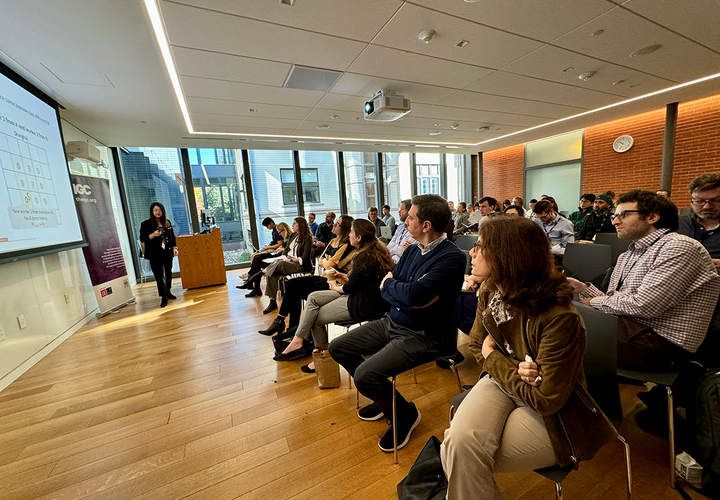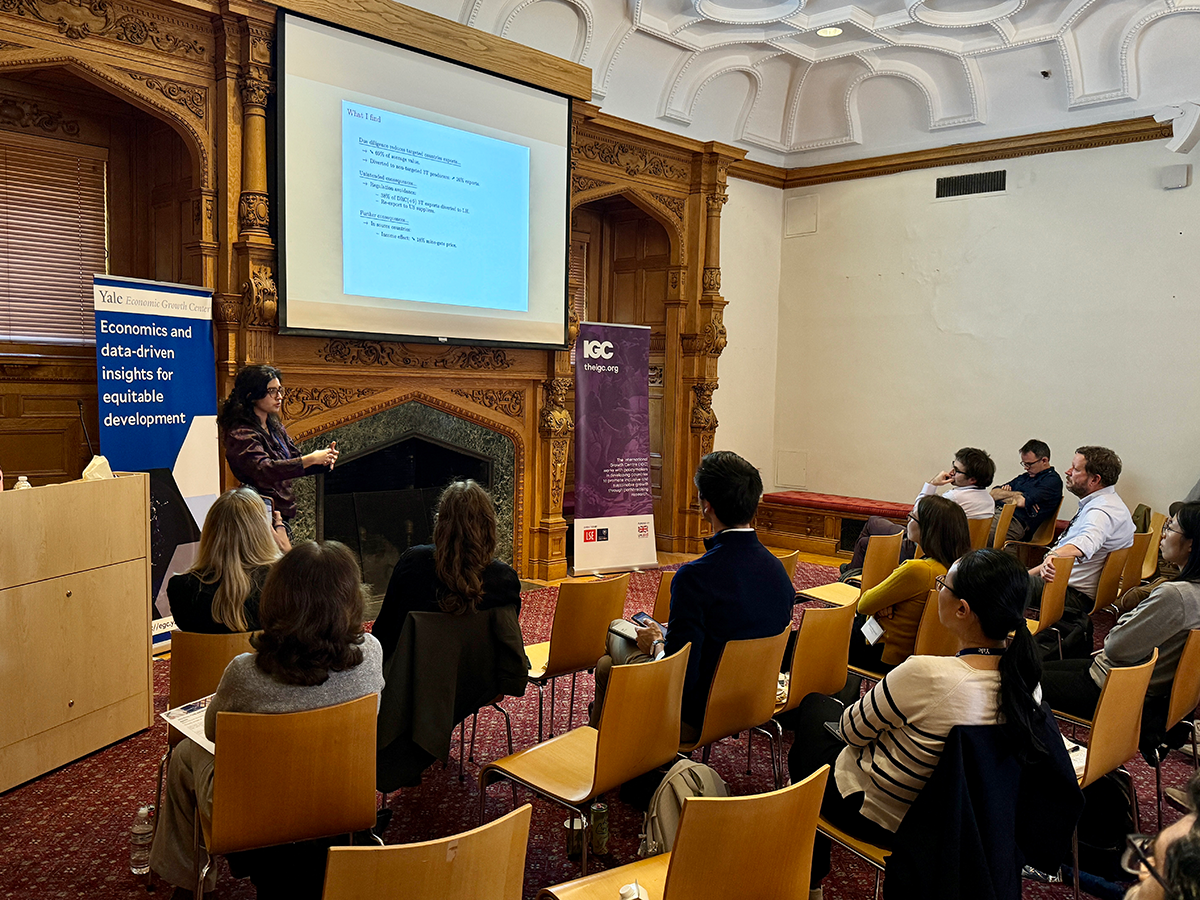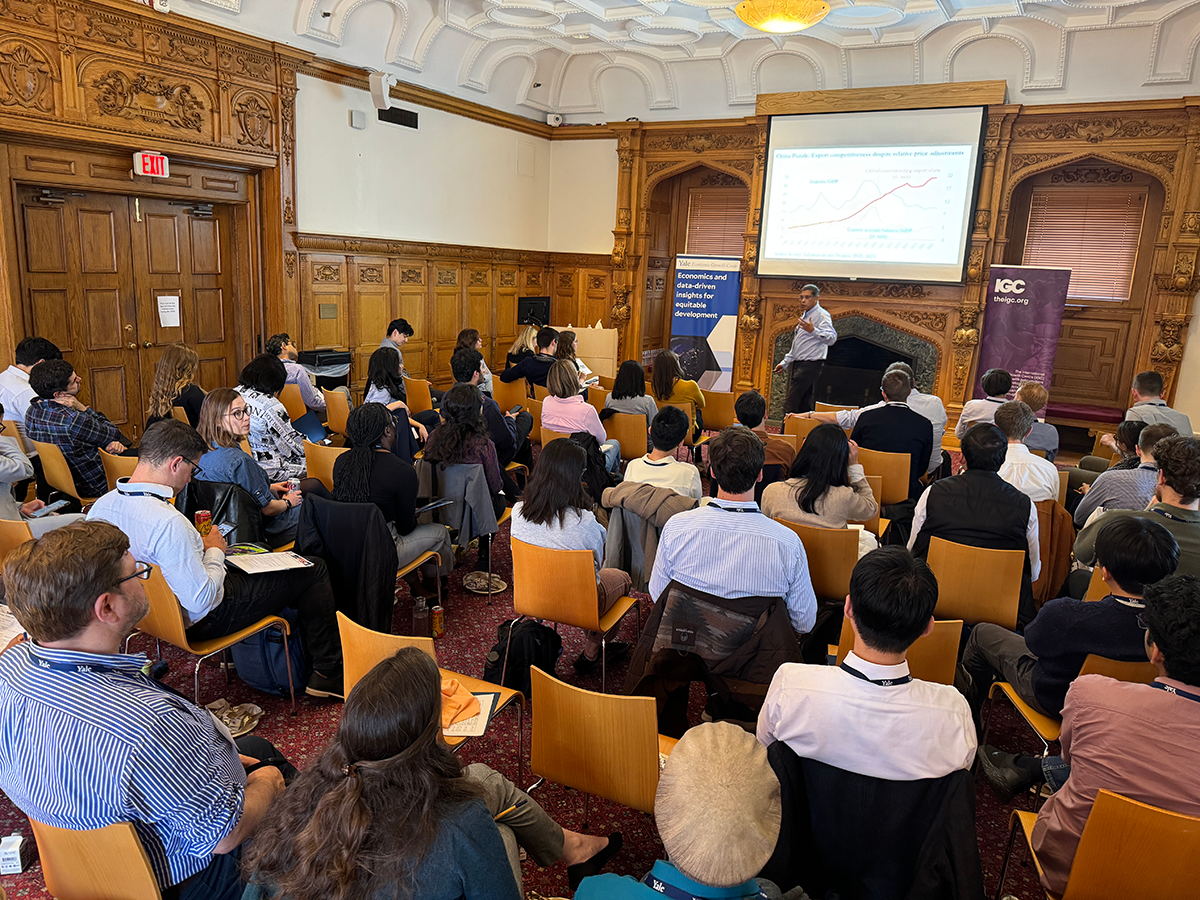Event recap: Firms, Trade, and Development Conference 2024
This year’s conference showcased economic research on topics from digital adoption and migrant networks to environmental and market policies, offering insights into transformative policies for low- and middle-income countries.

How can targeted interventions drive productivity growth in low- and middle-income countries (LMICs)? What roles do environmental regulations, migrant networks, digital technology, and market distortions play in shaping economic outcomes? These were some of the questions explored at the 2024 Firms, Trade, and Development Conference, co-hosted by the Yale Economic Growth Center (EGC) and the International Growth Centre (IGC).
Held on October 24-25, the conference gathered over 100 participants, including economists, policymakers, and industry leaders, to discuss new research on how firms in LMICs respond to market dynamics and the role of policy in fostering growth. This was the second year running that the conference was jointly hosted by EGC and IGC, however unlike last year, this year the event was held in person at Yale. Organized by Penny Goldberg, Amit Khandelwal, Lauren Falcao Bergquist, and Mayara Felix, the conference also featured an Academic Committee with members from MIT, University of Warwick, and Ashoka University.
With notable speakers like Arvind Subramanian (Peterson Institute for International Economics), alongside a policy panel featuring Camilla Sacchetto (Economist, World Bank), Tim Dobermann (IGC Research Director), Abigayle Davidson (ANDE), and Christian Lippitsch (IGC Rwanda), this year’s conference emphasized translating rigorous research into actionable insights.
Russell Morton, an EGC Postdoctoral Associate for the Markets and Development initiative, highlighted recent research trends on firms and development in a pre-conference blog post, emphasizing how workplace improvements and digital tools can drive productivity and broader economic growth.
The 2024 conference showcased diverse themes, from digital adoption and migrant networks to environmental and market policies, offering insights into transformative policies for LMICs.
Thursday, October 24: Understanding market distortions, productivity, and growth
The conference started with discussing the microeconomic foundations of development, focusing on understanding market distortions, economic slack, and productivity growth in LMICs.
The incidence of distortions
David Atkin’s study examines how economic issues like taxes, borrowing limits, and market power reduce efficiency and impact social groups unequally in Chile. Poorer households face higher prices and lower wages, while wealthier ones, often owning businesses, may benefit. This research shows how these distortions not only slow growth but also widen inequality.
David Atkin of MIT and NBER presents his study in the opening address of the 2024 Firms, Trade, and Development Conference.
Details
- The Incidence of Distortions.
- Authors: David Atkin, Federico Huneeus, Baptiste Bernadac, and Dave Donaldson.
- Speaker: David Atkin (MIT and NBER).
Slack and economic development
Tilman Graff presented his study on “slack” which reveals that 20% of businesses in Kenya operate at only 75% capacity, often due to low demand in rural areas. By giving cash transfers to these businesses, the researchers found that they could reduce slack and improve resource use. This suggests that increasing demand in poorer areas can boost productivity and growth without needing new investments in equipment or workers.
Details
- Slack and Economic Development.
- Authors: Tilman Graff, Michael Walker, Nachiket Shah, Edward Miguel, Dennis Egger and Felix Samy Soliman.
- Speaker: Tilman Graff (Harvard University).
Opening the brown box
Lakshmi Naaraayanan’s research shows that strict pollution laws in India reduce pollution but also discourage new businesses, leading to 12% fewer startups and 5% fewer product types, especially in high-pollution industries. To stay profitable, firms focused on more lucrative products, reducing product variety overall.
Details
- Opening the Brown Box.
- Authors: Rebecca De Simone, S. Lakshmi Naaraayanan and Kunal Sachdeva.
- Speaker: S. Lakshmi Naaraayanan (London Business School).
Regulating foreign suppliers
Ninon Moreau-Kastler examined the effects of US regulations, like the Dodd-Frank Act, on the use of conflict minerals. Her findings show a 20% reduction in conflict minerals sourced from African war zones, though some companies bypassed the law by sourcing from countries with weaker regulations. This study reveals both the strengths and limitations of regulatory approaches.

Ninon Moreau-Kastler of the Paris School of Economics presents findings on the effects of US regulations during the 2024 Firms, Trade, and Development Conference.
Details
- No Blood in My Mobile: Regulating Foreign Suppliers.
- Authors: Ninon Moreau-Kastler.
- Speaker: Ninon Moreau-Kastler (Paris School of Economics).
Labor productivity impacts of air purifiers
Maulik Jagnani’s study on air quality improvements in Bangladeshi factories found that providing air purifiers increased labor productivity by 10%. The experiment showed that better air quality reduced worker fatigue and absenteeism, suggesting that workplace health investments can yield significant productivity benefits, particularly in high-pollution areas.
Details
- Authors: Maulik Jagnani, Ashfaqul Chowdhury, Teevrat Garg, and Martin Mattsson.
- Speaker: Maulik Jagnani (Tufts University).
Impacts of roads on structural transformation and businesses
Wei Qian’s analysis of road infrastructure in China and India shows uneven impacts on local business growth. While road improvements spurred business expansion in rural China, they led to a decline in business numbers in industrialized areas of India. This contrast highlights that infrastructure projects have varied effects depending on the existing economic base.
Details
- Melitz Meets Lewis: Impacts of Roads on Structural Transformation and Businesses.
- Authors: Wei Qian , Joseph P. Kaboski, Will Jianyu Lu and Lixia Ren.
- Speaker: Wei Qian (Haverford College).
Trademarks and gains from variety
Giulia Lo Forte’s research explored how foreign trade affects product variety in the US. Using trademarks as a measure, she found that imports from Chinese-owned firms reduced innovation, while imports from other multinational firms boosted new products. This method revealed that trade's impact on US markets is more complex than previously measured.
Details
- Trademarks and Gains from Variety.
- Authors: Giulia Lo Forte.
- Speaker: Giulia Lo Forte (University of British Columbia).
Keynote address: New Perspectives on Trade
Delivering the keynote address, Arvind Subramanian discussed what he termed the “Nanoization” of trade economics, referring to the narrow focus on micro-level issues that can sometimes overshadow larger structural challenges. Subramanian reflected how India has experienced economic growth without following traditional structural transformation patterns. He urged researchers and policymakers to adopt a broader perspective that considers the systemic forces shaping development in LMICs.
“We need to look beyond the micro-level frictions and understand the larger forces at play, particularly in countries like India that don’t fit traditional growth models" - Arvind Subramanian

Arvind Subramanian delivers his keynote address at the 2024 Firms, Trade, and Development Conference.
Friday, October 25: Macroeconomic trends, policy implications, and new frontiers
The second day of the conference broadened the scope to encompass macroeconomic trends, policy implications, and emerging research frontiers in development economics.

Jiayue Zhang (Brown University) asks a question during a presentation at the 2024 Firms, Trade and Development Conference.
Habit formation in labor supply
Yogita Shamdasani’s study on labor attendance in India’s informal sector found that small attendance bonuses boosted worker attendance by 23%, with lasting effects even after payments stopped. However, disruptions like family obligations quickly reduced attendance, suggesting that consistent incentives are key to maintaining work habits.
Details
- Habit Formation in Labor Supply.
- Authors: Yogita Shamdasani , Luisa Cefala, Supreet Kaur and Heather Schofield.
- Speaker: Yogita Shamdasani (National University of Singapore).
Benefits and costs of migrant networks
Yulu Tang’s research on migrant networks in China’s food delivery industry found that workers who clustered with hometown peers became more productive, but wage competition increased during hometown crises, causing a 10% wage decline. This study underscores the balance needed between the benefits and challenges of migrant networks in urban labor markets.
Details
- To Follow the Crowd? Benefits and Costs of Migrant Networks.
- Authors: Yulu Tang.
- Speaker: Yulu Tang (Dartmouth College).
The effect of immigration enforcement abroad on immigrants’ home-country firms
Daniel Osuna’s job market paper on US deportations to Mexico revealed unexpected benefits for local economies. Regions with higher deportation rates saw an increase in business creation and revenue, as deportees brought back skills and resources gained in the US, leading to business growth in their home communities.
Details
- The Effect of Immigration Enforcement Abroad on Immigrants’ Home-Country Firms
- Authors: Daniel Osuna-Gomez and Eduardo Medina-Cortina.
- Speaker: Daniel Osuna-Gomez (Central Bank of Mexico).
Asymmetric information and digital technology adoption
Deivy Houeix’s research examined the effects of digital payment adoption in Senegal’s informal taxi industry. When drivers’ digital transactions were transparent to taxi owners, driver effort increased by 29%, but many initially resisted due to privacy concerns. With privacy assurances, adoption nearly doubled, highlighting the need for a balance between transparency and privacy to encourage digital uptake.
Details
- Asymmetric Information and Digital Technology Adoption: Evidence from Senegal
- Authors: Deivy Houeix.
- Speaker: Deivy Houeix (MIT).
Measuring and estimating retail productivity
Ajay Shenoy introduced a new estimator for retail productivity that examines customer attraction, inventory management, and product selection. His study in Zambian shops showed that focusing only on one area of productivity can give misleading results, stressing the need for a balanced approach in policy targeting retail sector growth.
Details
- Measuring and Estimating Retail Productivity.
- Authors: Ajay Shenoy, Brenda Samaniego de la Parra (UC Santa Cruz).
- Speaker: Ajay Shenoy (UC Santa Cruz).
Returns to capital for whom?
Jiayue Zhang’s study in Ghana explored the effects of cash transfers on small firms, finding that both business owners and workers invested in equipment, leading to 12% higher business earnings and an 8% wage increase. This research challenges the view that only owners contribute to firm growth, highlighting workers as key investors too.
Details
- Returns to Capital for Whom?
- Authors: Jiayue Zhang, Morgan Hardy and Jamie McCasland.
- Speaker: Jiayue Zhang (Brown University).
Panel discussion: Shaping policy through evidence
A panel of distinguished policy researchers and practitioners gathered for the "From Research to Action: Shaping Policy Through Evidence" session at Yale, discussing the translation of research into impactful policy interventions for LMICs.
Camilla Sacchetto (World Bank, formerly IGC Jordan) stressed the need to build trust with policymakers and align research with local contexts, drawing from her work in Jordan. Christian Lippitsch (IGC Rwanda) shared insights on export promotion in Rwanda, stressing the value of context-specific, adaptable interventions. Tim Dobermann (IGC Research Director) discussed IGC’s demand-driven model, which tailors research to directly address the specific needs of policymakers in LMICs.
Abigayle Davidson (ANDE) highlighted the importance of making research accessible and relevant to small businesses that drive job creation, noting, “It is essential not just to generate evidence, but to make sure it’s accessible, actionable, and aligned with policymakers’ priorities.” She emphasized clear communication to bridge research and policy effectively.
The panel highlighted the importance of trust, responsive research, and clear communication to foster meaningful change in LMICs.

Members of the panel discuss policy implementation during the 2024 Firms, Trade and Development Conference.
Looking forward
The 2024 Firms, Trade, and Development Conference showcased how firms, markets, and policy shape economic outcomes in LMICs. Researchers highlighted the impact of demand-side policies, like cash transfers, on productivity by reducing resource underutilization. Topics spanned economic distortions, slack, environmental regulation, and digital technology, underscoring the importance of evidence-based, context-sensitive policies for inclusive growth.
As economics tackles global challenges, insights from this conference point toward new directions for research and policy. We look forward to continuing these discussions at next year’s conference.
This article was published in collaboration with the International Growth Centre.